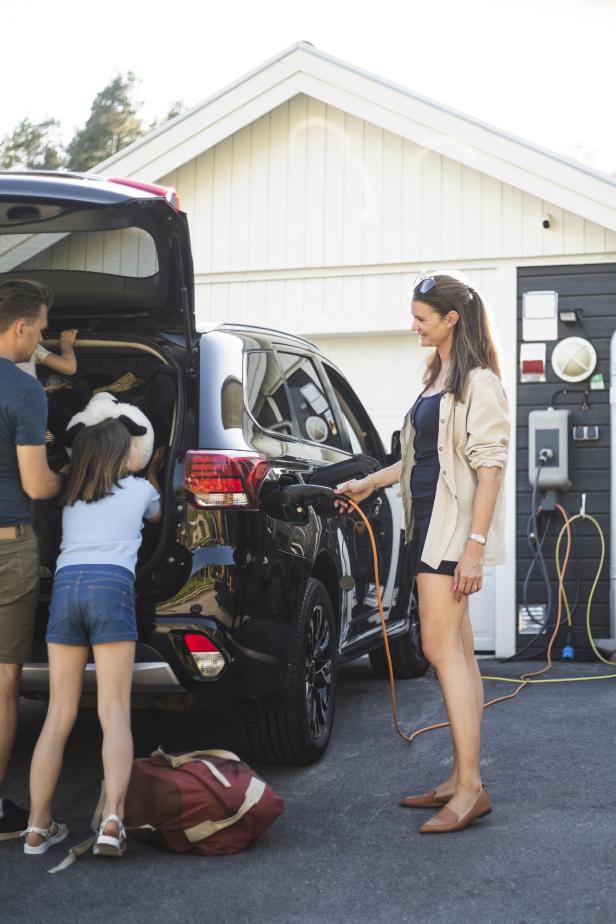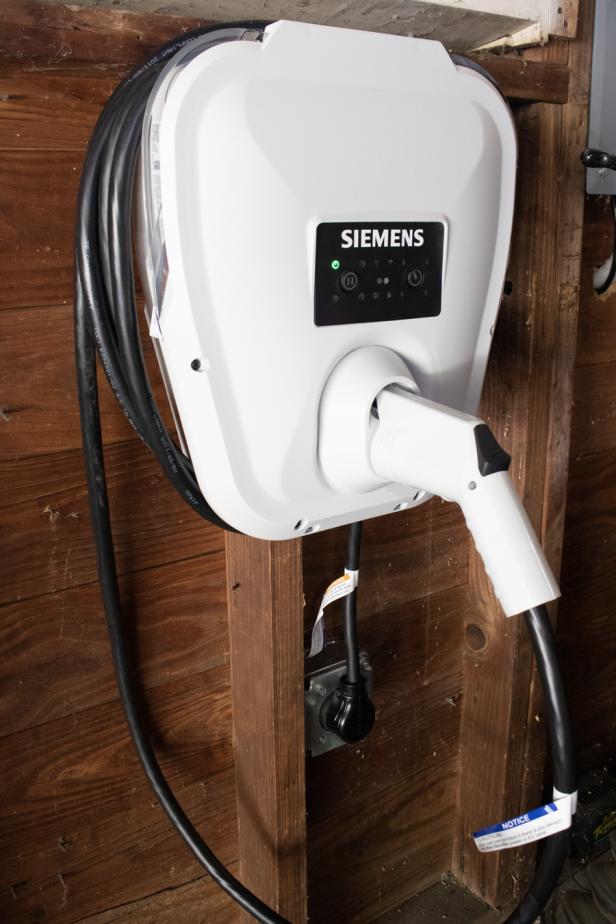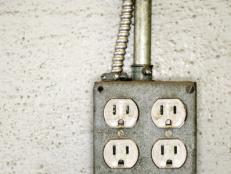Installing an EV Charger at Home
Make the most of your electric vehicle by investing in a convenient, affordable home charging station.

In the six years since becoming an electric vehicle owner, the most commonly asked questions are "aren’t you afraid of running out of battery" and "where do you charge it?"

Maskot
EV charging station installed on the front of a garage.
My answers go hand-in-hand. In short, EV charging at home offers convenience and efficiency and takes all fear out of having a limited range.
Running out of battery on our daily adventures isn’t likely with my Chevy Bolt (~280-mile range) because I have the perfect charging setup at home. Now, you may be lucky enough to have a Level 2 or Level 3 (DC Fast) charger available at or near where you work, but installing your own home charger takes the cake.

Emily Fazio
Level 2 EV charger installed in a garage with a 240-volt outlet.
If you’re considering switching to an electric vehicle, it’s absolutely worth installing your own EV charger at home.
Three Types of EV Chargers
Let’s start by acknowledging the main differences in charging stations.
- Level 1 Charger: This is a 120-volt plug, the same kind of outlet that powers your toaster and television. EVs are sold with a 120-volt charge cord so you can drive off the lot and plug in your vehicle when you get home. Be forewarned, though: The speed at which batteries charge varies by car model. This charge is not much more than a trickle charge and it can take 24-36 hours to bring your battery charge to a comfortable range.
- Level 2 Charger: These charging stations attach to a 240-volt plug outlet, just like your electric dryer or water heater. They are the most common home charging stations and are also frequently installed in public lots. A Level 2 unit can recharge a vehicle battery in a few hours or easily overnight. We find that we can get approximately 30 miles/hour added to our range using a Level 2 charging station at home.
- Level 3 Charger: The fastest charging stations are only installed at commercial sites. You will not find this for home use. They are often referred to as Fast Charging or Supercharging (Tesla). You’ll likely see them mapped at site hosts like car dealerships, highway stops, corporate office parks or active, public places like shopping plazas. You can top off your vehicle in minutes or charge a nearly depleted battery in 30 minutes.
Benefits of EV Charging at Home
- Convenient charging. You always know you’ll have access to a plug when you need it.
- Make the most of off-peak utility times. Charging during off-peak hours can save you more money than charging at high-use times of day.
- Leverage benefits from an existing solar array. Make the most of your solar panels and use the energy to support your vehicle charging.
- Reduce range anxiety. Topping off the battery during the day ensures you’ll be able to get to all the places you need to go.
- Increase your home value. Adding a 240-volt infrastructure for a car charging station at home is appealing to home buyers.
Can I Install an EV Charger Myself?
Simply put: Yes! If you already have access to a 240-volt outlet, you can easily install your own charger. For many models, it's as easy as attaching the unit to a stud on the wall and plugging the cord into the outlet.
If you need to have your unit hardwired, rely on a knowledgeable electrician who can confirm that your infrastructure can support it. If you need to have a new outlet installed or relocated for convenience, you should also start by contacting an electrician so that your install meets local codes.

Emily Fazio
EV charging ports for a Level 2 charge station.
EV Charging at Home FAQs
How Much Does a Level 2 Charger Cost?
Installing electric vehicle charging stations at home can cost between $300-$800. You should also budget $200-$400 to hire an electrician to upgrade your circuits and install your home charging station.
Are There Certain Times of Day it is Best to Charge Your EV?
Ben Kolo, franchise owner of Mr. Electric of Central Iowa, a Neighborly company, says "the best time to charge EV vehicles is during off-peak times. Many electrical utilities charge less during off-peak times. The standard recommendation for charging is 12 a.m. until 3 a.m. The charger can be controlled by a timer to charge during specific times."
If you’re out of the house all day, the easiest thing to do is plug in when you arrive home. It will be charged and ready to roll in the morning.

Caia Image
Adopting eco-friendly technologies at home, starting with an EV.
Do Solar Panels Provide Enough Energy to Charge an EV?
The answer is … possibly! Refer to your energy statements and audit your usage as you consider this option. Kolo points out that at installation, "most solar arrays are configured to carry the typical load for each specific house. Adding an electric vehicle to the load may not be supported by your array, so it’s best to refer to your energy bill usage information as you decide whether to add more panels."
Electricity costs significantly less than gasoline, but having a solar array substantial enough to charge our electric vehicle is a dream that I’m working toward.
Do I Need to Upgrade My Electrical System?
A homeowner shouldn’t attempt a DIY upgrade to switch an existing 120-volt plug into a 240-volt outlet for car charging without an understanding of the circuitry of the home. "Both Level 1 and 2 EV charger installations require a dedicated circuit, so a qualified electrician should be hired," cautions Kolo. "Our recommendation is that Level 2 chargers be hardwired into your electrical system. The cord and plug are susceptible to heating and loose connection due to the heavy current draw day after day for this type of appliance."
Do I Need Two EV Chargers if I Have Two Electric Vehicles?
Not necessarily. If the Level 2 charger is installed in a space where it could reach both vehicles, a household can easily share one plug for two EVs. Most vehicles and connectors can be used interchangeably to recharge a vehicle. Have your electrician install your 240-volt outlet and charging station in a space that considers the future (a day when you might have two EVs to recharge).
Can You Install an EV Charger Outdoors if You Don’t Have a Garage?
Installing an electric car charger on the side of your home or a structure on your property is often the only option for some vehicle owners. "According to industry experts and manufacturers, the best option is to install an EV charger indoors if possible," says Kolo, "but yes, most EV chargers are rated for exterior installations. The EV charger itself is typically wall-mounted and waterproof. The cord is waterproof and when connected to the EV charging port, the connection creates a watertight seal."
Fluctuations in temperatures and weather conditions can affect the consistency of a 120-volt charge, so upgrading to a 240-volt system makes sense if you’re charging in your driveway. An electrician will be best able to check the manufacturer ratings when installing an EV charger outdoors.






































